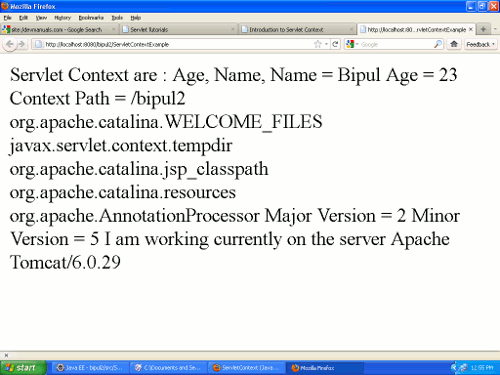In this section we will discuss about the ServletContext simple example.
Servlet Context Example
In this section we will discuss about the ServletContext simple example.
In this example I used some methods of the ServletContext interface. Through which we can easily understand the basic of Servlet Context. Methods that are used in are :
getInitParameter();
getInitParameterNames();
getMajorVersion();
getMinorVersion();
getServerInfo();
Meaning/Work of all the methods described above are clear by their names.
Example : ServletContextExmaple.java
import java.util.Enumeration;
import java.io.IOException;
import java.io.PrintWriter;
import javax.servlet.ServletContext;
import javax.servlet.ServletException;
import javax.servlet.http.HttpServlet;
import javax.servlet.http.HttpServletRequest;
import javax.servlet.http.HttpServletResponse;
public class ServletContextExample extends HttpServlet {
public void doGet(HttpServletRequest req, HttpServletResponse res)
throws ServletException, IOException {
res.setContentType("text/html");
PrintWriter pw = res.getWriter();
ServletContext cntxt = getServletContext();
pw.println("Servlet Context are : ");
Enumeration enmparam = (Enumeration) cntxt.getInitParameterNames();
while (enmparam.hasMoreElements()) {
pw.println(enmparam.nextElement() + ", ");
}
pw.println("");
pw.println("Name = " + cntxt.getInitParameter("Name"));
pw.println("Age = " + cntxt.getInitParameter("Age"));
String s = cntxt.getContextPath();
pw.println("Context Path = " + s);
int a = cntxt.getMajorVersion();
pw.println("Major Version = " + a);
int b = cntxt.getMinorVersion();
pw.println("Minor Version = " + b);
String info = cntxt.getServerInfo();
pw.println("I am working currently on the server " + info);
}
}
Output : When you will execute this program the output will be displayed as :



[ 0 ] Comments